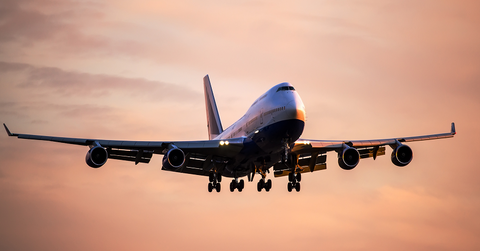BofA Cut Boeing Target Price Due to Rising MAX Uncertainty
On Monday, Bank of America analyst Ronald Epstein lowered his target price on Boeing stock by $10 to $360. However, he maintained his “neutral” rating.
Nov. 20 2020, Updated 5:14 p.m. ET

Another analyst cut the target price on Boeing (BA) stock due to rising uncertainty about 737 MAX aircraft. On Monday, Bank of America (BAC) analyst Ronald Epstein lowered his target price on the stock by $10 to $360. However, the analyst maintained his “neutral” rating on the stock, according to a CNBC report December 23.
Why BofA cut Boeing’s target price 
Epstein’s downward price revision reflects growing concerns about the timing of the Boeing 737 MAX’s returns to service. The analyst doesn’t see MAX returning to skies before May 2020, according to the CNBC report.
In a client note, the analyst said, “Due to the changes in production schedules as well as commentary by both the supply base and airlines, we are now estimating that the global average (North American and other regions) return to service (RTS) of the 737 MAX will be May 2020 (vs. March 2020 previously),” according to CNBC.
Due to rising uncertainty about the 737 MAX’s return, several airlines have removed MAX flights from their flying schedule through the second quarter. Southwest Airlines (LUV) and American Airlines (AAL) have extended the MAX grounding period until April 13 and April 6, respectively. Last week, United Airlines removed MAX from the flying schedule through June 4.
MAX crisis got worse
A lot of things have happened with Boeing in the last few weeks—mainly negative elements. On December 16, Boeing’s management announced that it will halt MAX production in January. Boeing’s announcement came after the Federal Aviation Administration’s chief, Steve Dickson, said on December 11 that the agency won’t provide certifications to MAX this year.
Boeing’s decision to halt the 737 MAX started to impact suppliers. Aircraft part suppliers are adjusting their future production plans. On December 20, Spirit AeroSystems (SPR) announced that it would stop all of its 737 MAX deliveries to Boeing on January 1. Spirit builds about 75% of Boeing’s 737 MAX aircraft structure. Notably, Boeing’s 737 MAX accounts for over 50% of Spirit’s total revenues.
CFM International has also adjusted the production of LEAP 1B engines, which power the MAX aircraft. CFM International is a 50-50 joint venture between France’s Safran and General Electric. According to a report from the Wall Street Journal, General Electric and Safran have agreed to increase the production of LEAP 1A engines and reduce the LEAP 1B output. To learn more, read Spirit AeroSystems to Halt 737 MAX Deliveries to Boeing.
Boeing’s CEO Dennis Muilenburg lost his job due to ongoing troubles with the 737 MAX. On Monday, Boeing’s board fired Muilenburg due to his inability to resolve the MAX crisis. The company’s board also made massive management reshuffle to bring back the troubled jet. To learn more, read Boeing Ousts CEO amid 737 MAX Fiasco.
Downgrades from credit rating agencies 
Moody’s and S&P have downgraded Boeing following the MAX production halt announcement. On December 18, Moody’s cut its debt rating on the stock to “A3” from “A2.” The next day, S&P lowered its short-term rating to “A-2” from “A-1” and long-term rating to “A-” from “A.” The rating agencies cited similar reasons and raised concerns about the MAX production halt disrupting the supply chain.
Two prominent Wall Street analysts lowered their target prices on Boeing stock. Baird analyst Peter Arment and JPMorgan Chase analyst Seth Seifman have raised concerns about Boeing’s future cash flow position. They said that Boeing will continue to burn cash despite halting MAX production.
MAX’s ongoing troubles have made several analysts cautious about Boeing stock. Before the Ethiopian Airlines crash on March 10, approximately 79% of the analysts were bullish on the stock. However, the proportion has fallen to 43% as of today.
Before the Ethiopian Airlines crash, none of the analysts had a bearish view. Now, two of the 23 analysts have a “strong sell” rating. The average target price has also fallen 17% to $366.40 from $440 as of March 10.
